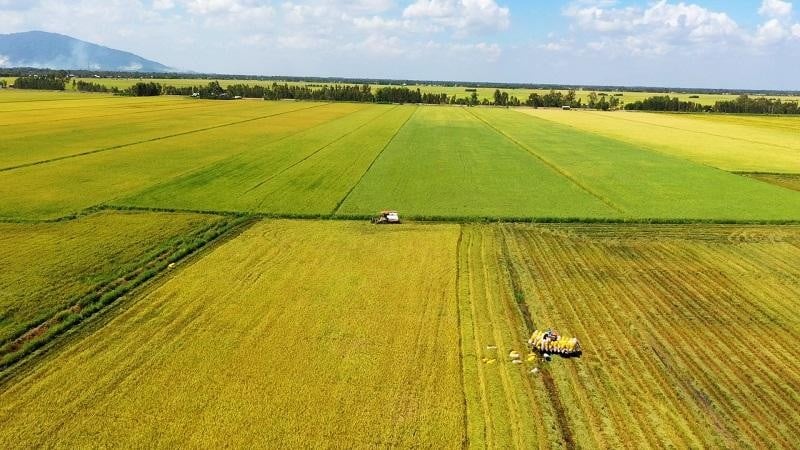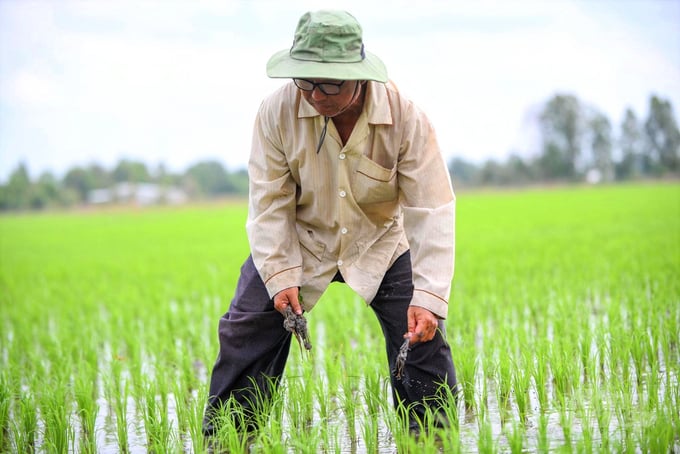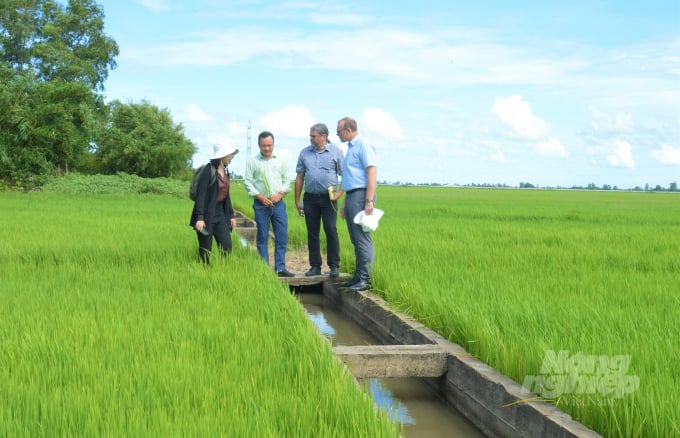November 19, 2025 | 03:40 GMT +7
November 19, 2025 | 03:40 GMT +7
Hotline: 0913.378.918
November 19, 2025 | 03:40 GMT +7
Hotline: 0913.378.918

The Vietnam Sustainable Agriculture Transformation Project (VnSAT) is considered the most successful international agricultural cooperation project ever and is a model in international cooperation. Photo: LHV.
On June 12, Mr. Li Guo, National Program Coordinator on Agriculture and senior expert in Agricultural Economics of the World Bank (WB) in Vietnam, informed the Department of International Cooperation (Ministry of Agriculture and Rural Development) said that the Vietnam Sustainable Agriculture Transformation Project (VnSAT) has received the World Bank's East Asia Awards (FY23 EAP Team Awards). Out of 80 projects participating in the contest, VnSAT is one of 13 projects receiving awards.
Mr. Li Guo thanked the Department of International Cooperation for its support and coordination in the past time. Simultaneously, we hope that the two sides will develop more effective cooperation in the future.
On the same day, Mr. Manuela V. Ferro, Vice President of the East Asia and Pacific Region (WB), also on behalf of the EAP Award Management Board, congratulated the Ministry of Agriculture and Rural Development.
"This is a great initiative", praised Mr. V. Ferro and highly appreciated the Project's results with the effective combination of development and climate change.
The Project has helped reduce 1.58 million tons of greenhouse gas emissions from rice cultivation annually (50% compared to the target), benefiting more than 1 million farmers economically, mobilizing financial private sector support, and impact on national and international low-carbon agricultural strategies.
The WB representative also said the agency is applying lessons from the VnSAT project in other countries, especially China.

93% of the project area applies the correct technical measures on economical irrigation, equivalent to 54,000 ha. Photo: LHV.
After more than seven years of implementation (2015 - 2022), the VnSAT project is considered the most successful international agricultural cooperation project ever and a model in international cooperation.
According to the Management Board of Agricultural Projects (MARD), the VnSAT Project has reviewed projects on restructuring sectors and sub-sectors, thematic plans, and policies for restructuring, contributing to increasing and strengthening institutional capacity to support restructuring implementation for agencies and units under MARD, provinces participating in the Project, partners, and networks in the value chain.
The VnSAT project was evaluated as excellently completed, with five development goals reaching and exceeding the original target, with the target exceeding 150%; 11 intermediate goals met and exceeded the initial goal. In addition, the Project has completed piloting in 5 areas, and the Ministry of Agriculture and Rural Development has accepted the research results.
93% of the project area is applying the correct technical measures on economical irrigation, equivalent to 54,000 ha, reaching 245% of the Project's target of 22,000 ha. Investment in infrastructure and equipment has created a premise for farmer organizations to develop production.

The VnSAT project has positively impacted rice production in particular and Vietnam's agricultural sector in general. Photo: TL.
For chain linkage activities, up to now, about 74,000ha of rice has been linked in production and product consumption between farmers' organizations and enterprises; ST24 and ST25 rice products have been consumed in the northern provinces, especially Hanoi, and have been consumed in some countries around the world.
In addition, about 14,700ha of coffee has been signed into off-take contracts with businesses. The products are consumed domestically and exported to the US and some countries.
Communication activities through mass media, especially Vietnam Agriculture Newspaper with hundreds of multimedia press products, have contributed to spreading the Project, especially scientific and technical advances, thereby changing people's behavior, promoting the restructuring of rice and coffee in particular, and Vietnam's agricultural sector in general.
Mr. Cao Thang Binh, the senior expert on agriculture of the World Bank in Vietnam, commented: The Vietnam Agriculture Newspaper has always accompanied and stood alongside the VnSAT Project in spreading the knowledge and benefits that the VnSAT Project has gained. The VnSAT project brings and plays a significant role in the success of the Project.
The Vietnam Agriculture Newspaper was assigned by the Ministry of Agriculture and Rural Development to be the technical support and communication unit for the VnSAT Project and has performed the communication task for the VnSAT Project in the three years 2020 - 2022. Accordingly, the Newspaper has implemented hundreds of media products, including news, articles, photos; Radio articles, newsletters - TV reports, videos, clips, forums - talks... in Vietnamese and English published in newspapers publications, media to millions of domestic and foreign readers about the VnSAT project.
Translated by Ha Phuc

(VAN) Integrating agricultural extension activities with ecotourism development unlocks promising new avenues for localities boasting specific advantages in grape and apple cultivation.

(VAN) Enterprises and cooperatives accompany farmers in Tay Ninh to develop an organic seedless lime growing area, paving the way for poverty reduction.

(VAN) There were times when Pho faltered, yet his aspiration to bring the pure aroma to those who truly value clean tea kept urging him forward.

(VAN) Bich Thao Coffee Cooperative pioneered products achieving the national 5-star OCOP standard, paving the way for Son La coffee to conquer international markets.

(VAN) The Bao La bamboo-and-rattan cooperative has been producing goods integrated into value chains. As a result, its products have reached global markets.

(VAN) The training course in An Giang equips learners with emission verification methods, thus creating a basis for low-emission rice production.

(VAN) Thu Lum commune is focusing on developing medicinal plants under the forest canopy, creating sustainable livelihoods for local people, and contributing to protecting the ecological environment.